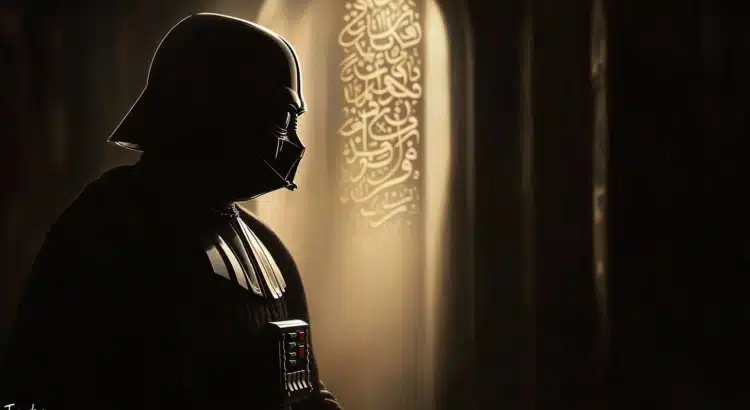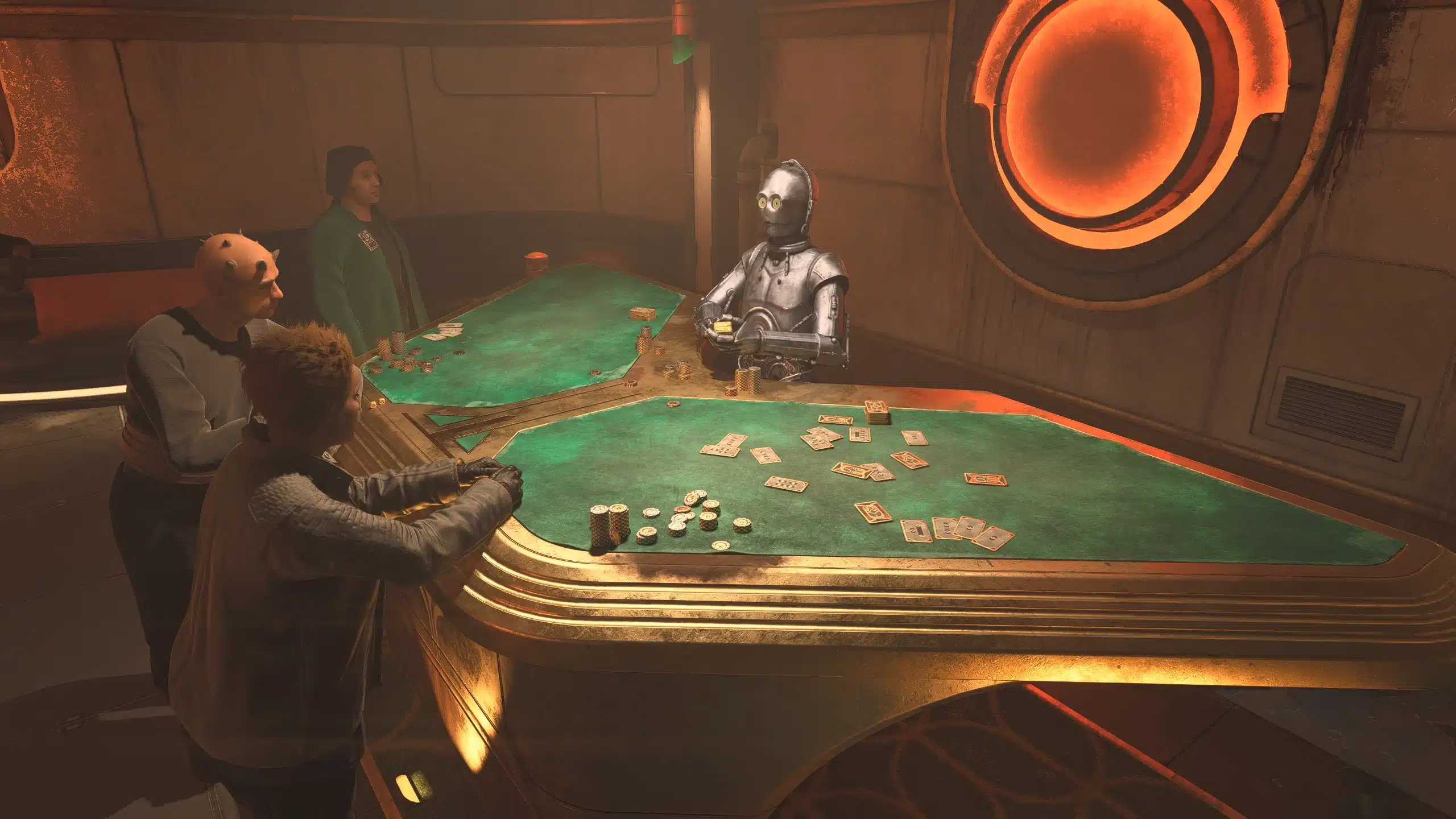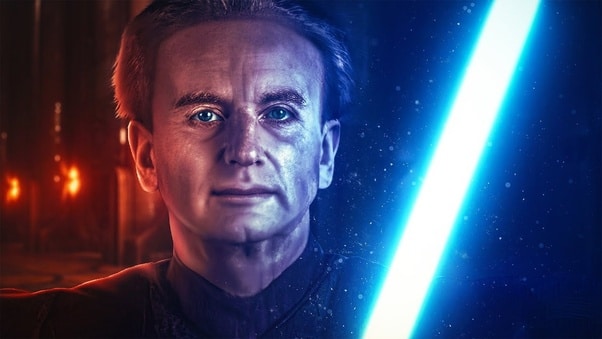There’s a reason Darth Vader remains one of the most iconic characters in film history. He’s not just a villain in a black helmet—he’s a walking contradiction. Ruthless, feared, and undeniably powerful… yet haunted by his past and, in the end, capable of something no one expected: redemption.
In Return of the Jedi, Vader doesn’t just save his son—he turns away from everything he once stood for. It’s a moment that hits hard, not just for Star Wars storytelling, but for anyone interested in the deeper questions of morality, accountability, and forgiveness.
And that’s where an unexpected parallel comes into view: the Islamic concept of Tawba—a spiritual framework of sincere repentance that teaches, no matter how far someone has fallen, the path back is never closed.
This article explores how Darth Vader’s final act of redemption mirrors the core teachings of Tawba in Islam, highlighting the idea that true forgiveness isn’t about forgetting the past—it’s about changing the future through remorse, sacrifice, and a sincere return to the light.
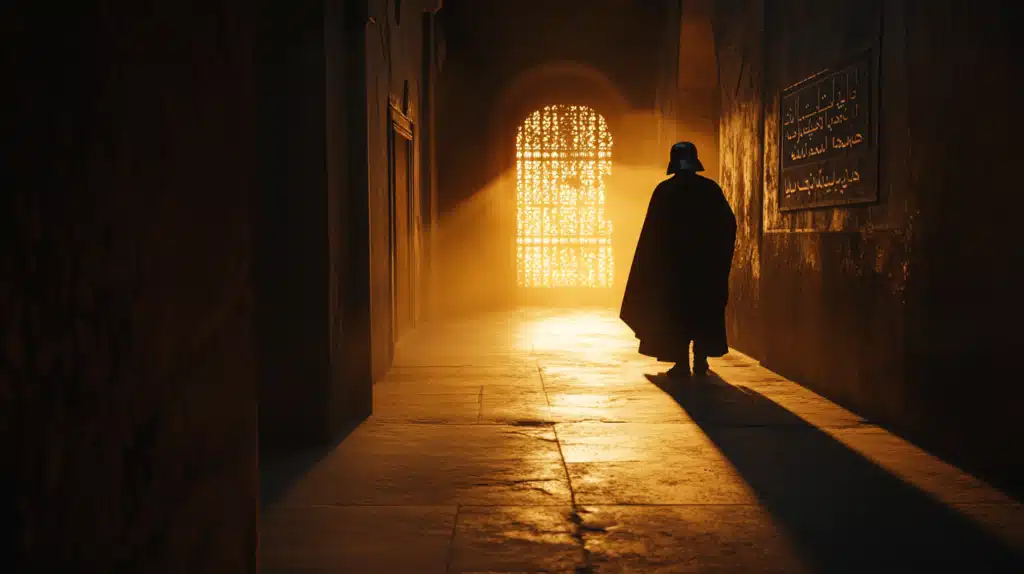
What Is Tawba? (Hint: It’s Not a Reset Button)
Let’s get one thing straight: Tawba isn’t a cheat code. It’s not a cosmic undo button where you press it and—poof—your bad deeds vanish and everyone forgets you ever messed up. In Islam, Tawba (توبة) is the process of repentance, but it’s way more layered than simply saying, “My bad.”
Think of it less like resetting a video game and more like rebuilding a crashed starship. It takes work, sincerity, and a deep internal change. And just like repairing a TIE fighter that’s been through hyperspace hell, there’s no shortcut. You have to be all in.
In Arabic, “Tawba” literally means “to return.” Spiritually, it means returning to God after going off course—whether that’s a little detour or full-on Darth Vader levels of darkness.
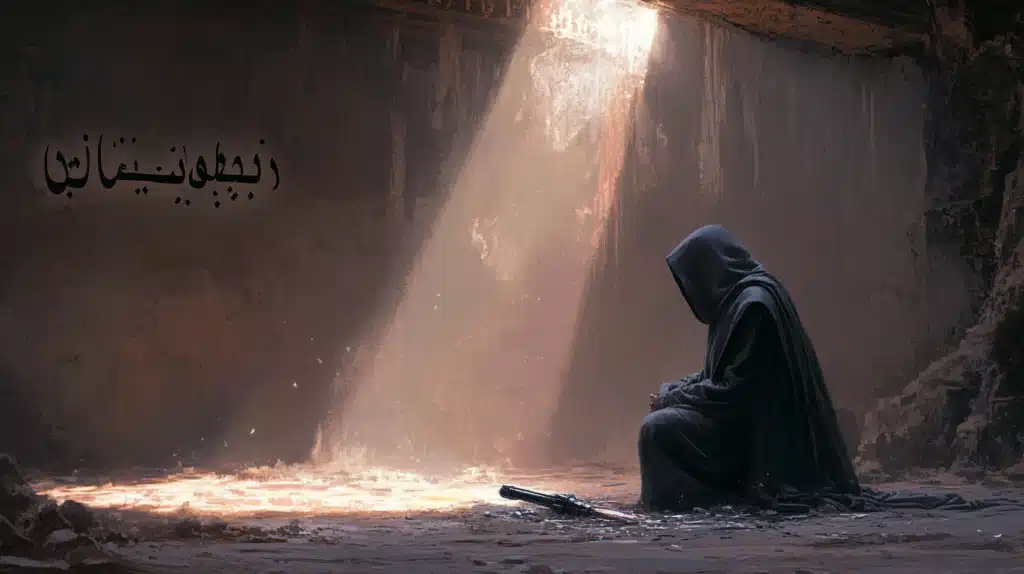
The Four Conditions of Sincere Tawba
Islamic scholars have laid out four key conditions for repentance to be considered sincere. And they don’t involve just feeling bad and moving on—they’re about real accountability.
- Recognizing the sin
First, you have to admit you messed up. This isn’t always easy, especially when the ego kicks in with excuses. But Tawba starts with owning your actions—no shifting blame, no “but I had a good reason.” It’s about facing the facts. - Feeling genuine remorse
Not performative guilt. Not regret that you got caught. We’re talking real, internal heartbreak over the wrong that was done. In Vader’s case, this was that moment of silent watching—when Luke is being tortured and the realization hits: What have I become? - Immediately stopping the sin
You can’t ask for forgiveness while keeping the dark side on speed dial. Repentance means walking away from the behavior completely—no foot in both worlds. When Vader turns on Palpatine, he doesn’t hesitate. He doesn’t say, “Let me think about it.” He acts. The change is immediate. - Resolving never to return to it
This one’s about commitment. Real Tawba means making a sincere promise not to go back to that path. You might struggle (because humans), but the intention to change must be authentic. Vader didn’t survive to prove this point long-term, but his final act shows his heart was in the right place.
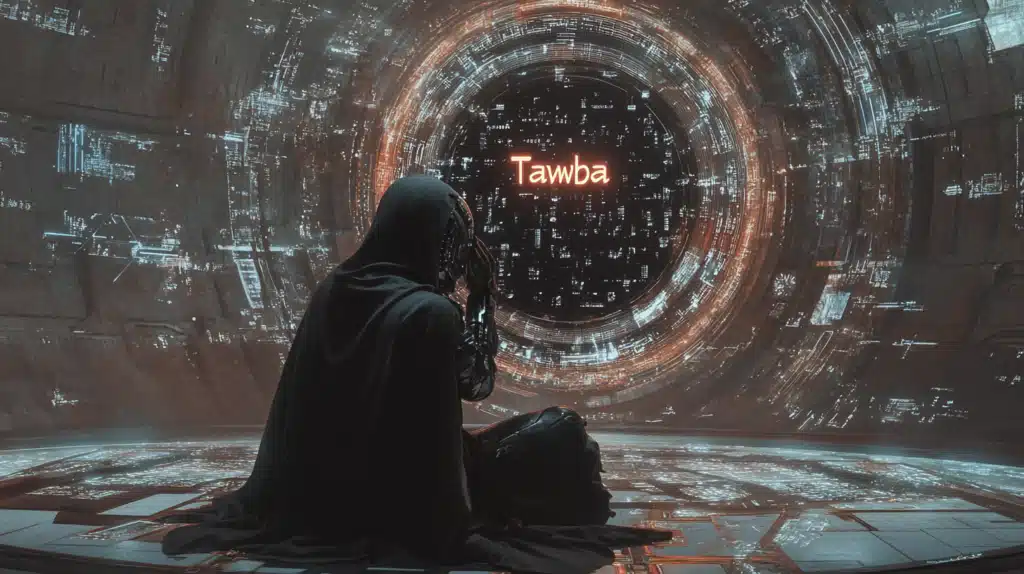
Tawba Is for Everyone—Not Just the Luke Skywalkers of the World
One of the most powerful teachings in the Quran is that no one is beyond redemption. You could have a past like a Sith Lord, and it still wouldn’t disqualify you from returning to the Light—as long as your repentance is real.
“Indeed, Allah forgives all sins. Indeed, it is He who is the Forgiving, the Merciful.”
— Surah Az-Zumar (39:53)
This verse is like the spiritual version of Obi-Wan saying, “There’s still good in him.” It’s a reminder that divine mercy outweighs human mistakes, even the colossal, galactic-level kind.
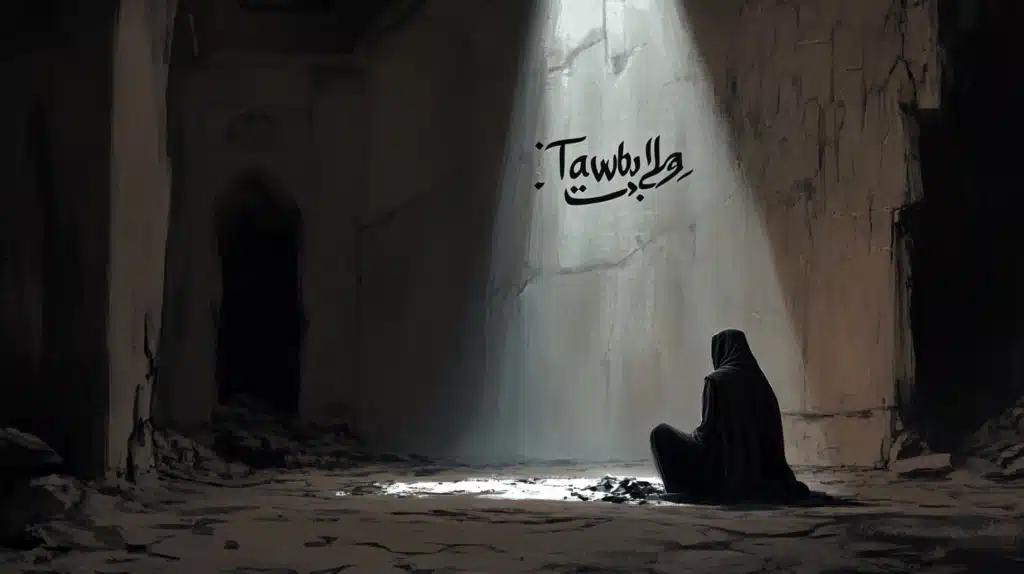
Tawba Is Not Transactional
And here’s another key point: Tawba isn’t about doing one good deed to cancel out a bad one, or offering a sacrifice in exchange for immunity. It’s not a negotiation. It’s a transformation. True repentance isn’t about what you get—it’s about who you become.
Darth Vader didn’t destroy the Emperor to earn a reward. He did it because he had changed. Because, after a lifetime of being feared, he chose—for the first time in decades—to act out of love and justice. That’s not a deal. That’s a decision.

It’s a Personal Journey, Not Public Relations
Another misconception? That repentance has to be public to count. It doesn’t. In Islam, Tawba is between the individual and God. There’s no press conference, no galactic statement. What matters is what’s happening in the heart.
Vader didn’t need an apology tour. He needed a moment of truth. And he got one.
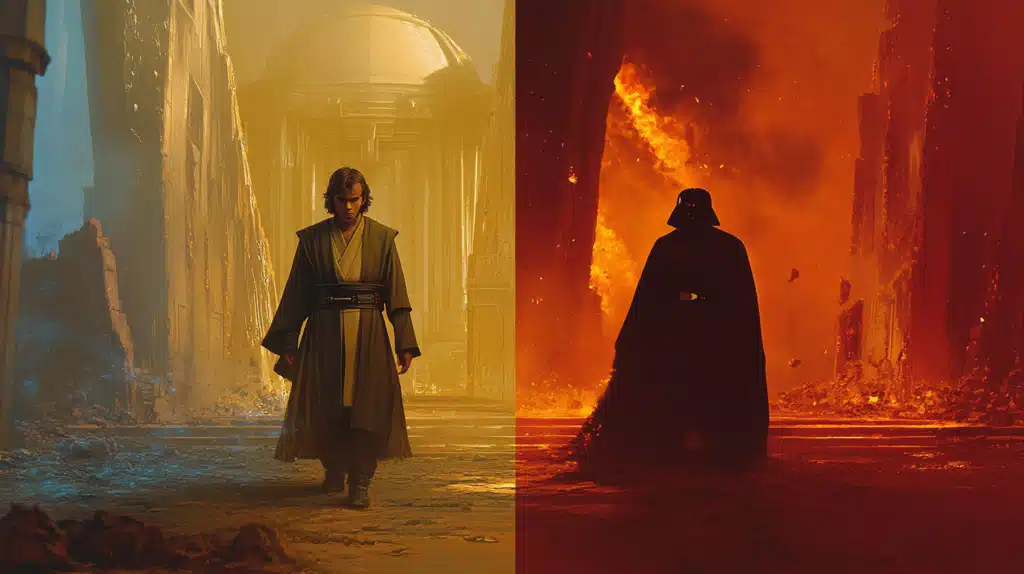
From Jedi Knight to Galactic Menace
Anakin Skywalker didn’t just fall—he plummeted. And he didn’t trip over a rock on the Jedi Temple steps. He dived into darkness with both lightsabers blazing.
The transition from Jedi Knight to Darth Vader remains one of the most iconic downfalls in cinematic history. And from a spiritual lens—especially when viewed through Islamic concepts like sin (dhanb) and deviation (dalal)—his story reads like a cautionary tale of what happens when unchecked emotions meet unchecked power.
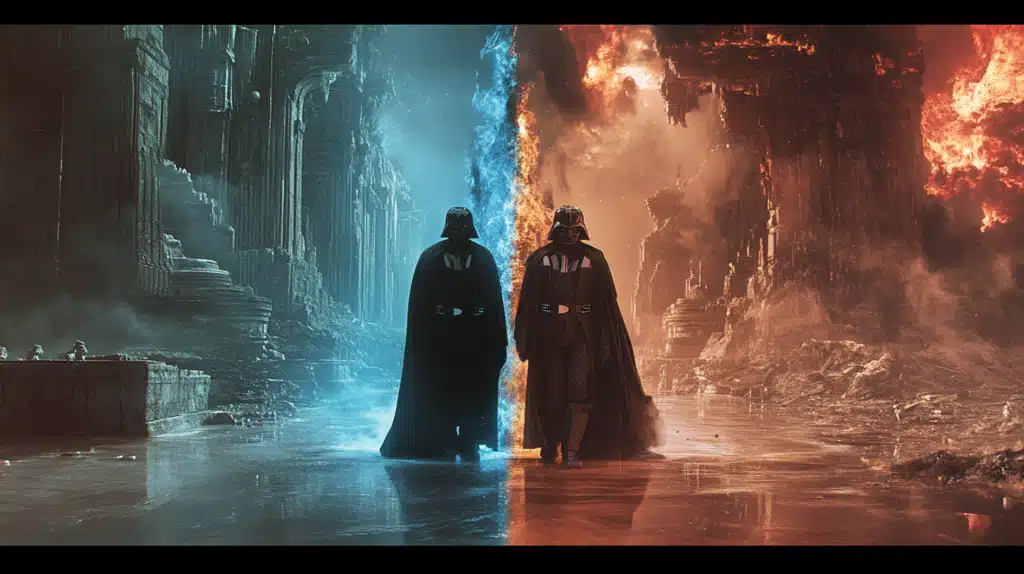
Anakin’s Fall: A Perfect Storm of Ego, Fear, and Bad Choices
Anakin’s descent into darkness wasn’t instant. It was slow, painful, and filled with warning signs. Fear of loss, a desperate need for control, anger over injustice—these were the seeds. Palpatine just knew exactly how to water them.
And here’s the key: every sin in Islam starts with a choice, often a small one. A justified lie. A selfish act. A moment of arrogance. The Quran warns repeatedly against allowing the heart to be corrupted, especially when ego (kibr) takes over:
“Have you seen the one who takes as his god his own desire?”
— Surah Al-Jathiyah (45:23)
That’s basically the Anakin Skywalker starter pack.
Instead of submitting to higher moral principles (like the Jedi Code or, in religious terms, divine guidance), Anakin made himself the center of everything. His fear of losing Padmé? Understandable. But his belief that he alone should decide life and death? That’s where things broke.

Order 66: When the Fall Becomes Action
One moment you’re the Chosen One. Next moment, you’re marching into the Jedi Temple and… well, it’s not pretty. Order 66 isn’t just a military directive—it’s the point of no return. It’s where Anakin stops struggling and fully embraces the dark side.
In Islamic theology, this would fall under what’s called zulm al-‘azim—a form of great injustice or oppression. Slaughtering innocents, betraying those who trusted you, and doing so knowingly is not just a personal failure—it’s an ethical earthquake.
“And do not follow desire, lest it lead you astray from the way of Allah. Indeed, those who go astray from the way of Allah will have a severe punishment.”
— Surah Sad (38:26)
What Anakin committed wasn’t just sin—it was willful corruption. He didn’t lose control. He chose control at the cost of everything else.
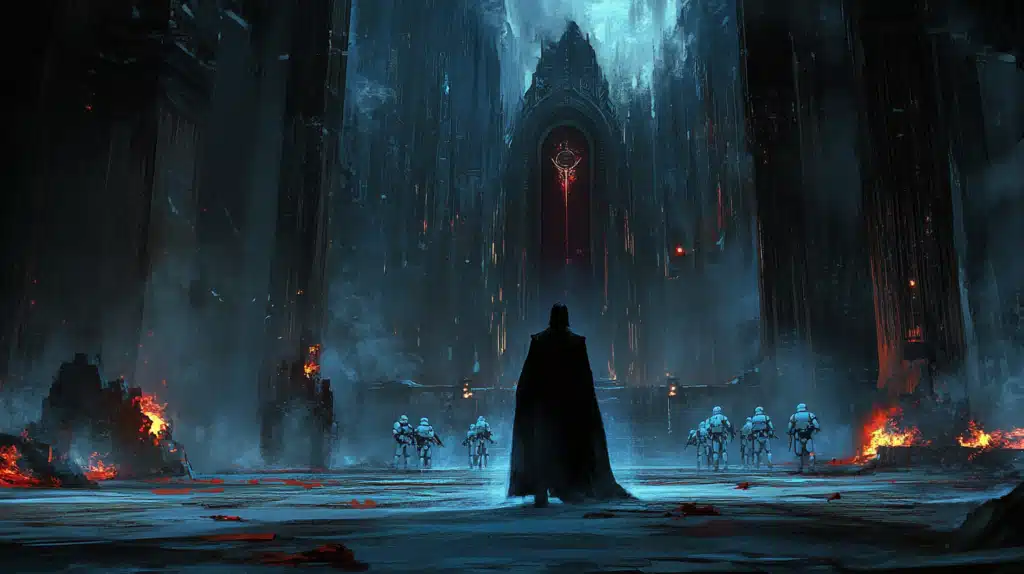
The Mask Doesn’t Hide the Guilt
Even as Darth Vader, the consequences of Anakin’s actions haunt him. He doesn’t smile. He doesn’t boast. He simply carries out orders with mechanical efficiency, like a man trying to silence his own conscience. And yet, there are flickers—moments that suggest all is not lost.
In Islam, this idea is mirrored in the concept of the fitrah—the natural state of the soul inclined toward goodness. No matter how deeply someone falls, a part of them still knows the truth. It whispers. It waits.
And for Vader, that whisper becomes a roar the moment he meets Luke.
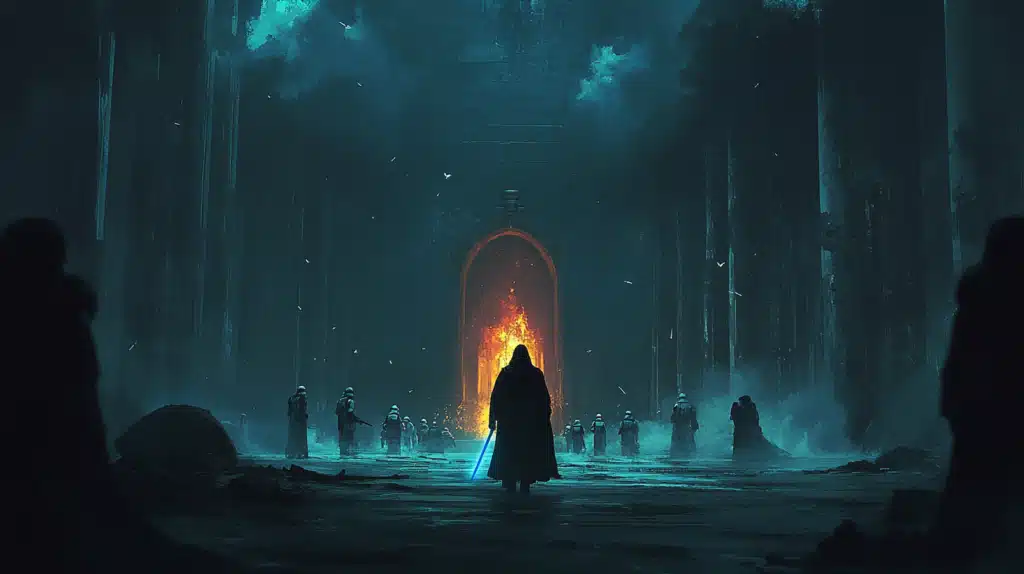
A Spiritual Cautionary Tale in Sci-Fi Armor
Anakin’s transformation into Darth Vader represents the extreme version of what happens when spiritual decay goes unchecked. It shows that even the most gifted, most promising individuals can lose themselves when fear, pride, and desire take control.
But it also sets the stage for one of the most important truths in Islamic belief: as long as you’re alive, redemption is still possible.
Vader’s fall might have been epic, but it wasn’t final. And that’s what makes his story so compelling—not just in the Star Wars universe, but in a spiritual context as well.
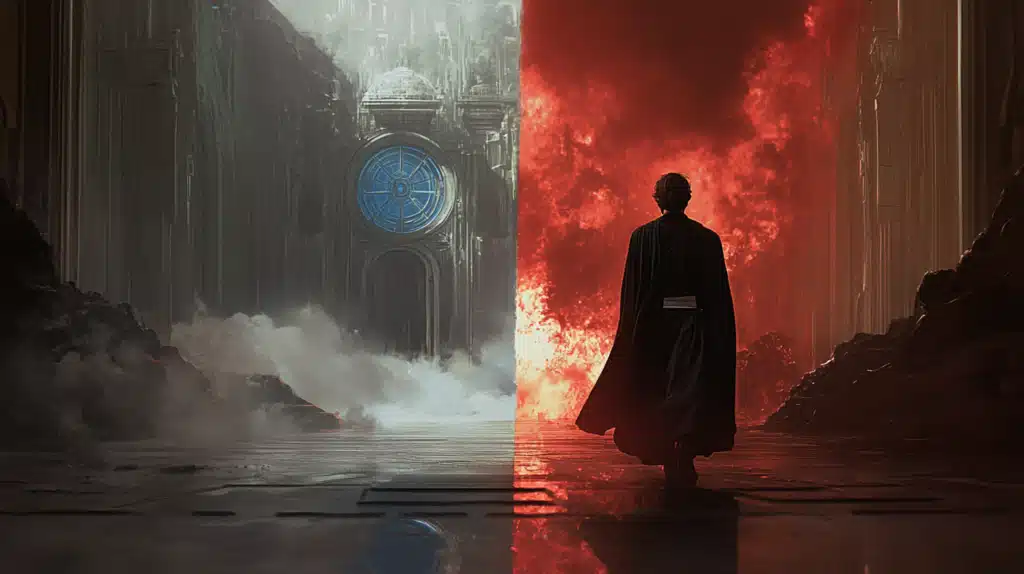
But… Can That Be Forgiven?
It’s the question that’s lingered since Return of the Jedi first hit theaters: Can Darth Vader really be forgiven? After everything he did—the betrayal, the violence, the years spent as the Empire’s chief enforcer of fear and oppression—is one last heroic act enough?
From a cinematic perspective, the answer is up for debate. But from an Islamic theological standpoint? It’s surprisingly clear: Yes—if the repentance is sincere.
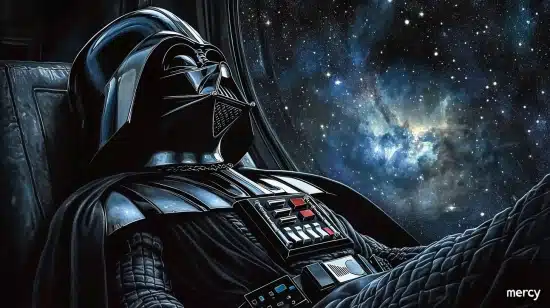
No Sin Too Great, No Soul Too Far Gone
One of the most powerful messages in the Quran is that no matter how dark a person’s past is, God’s mercy is always greater. The idea that someone can come back from even the most extreme wrongdoing isn’t just a feel-good concept—it’s a foundational principle in Islam.
“And those who, when they commit an immorality or wrong themselves [by transgression], remember Allah and seek forgiveness for their sins—and who can forgive sins except Allah?—and do not persist in what they have done while they know.”
— Surah Al-Imran (3:135)
This verse captures the essence of what Vader experiences. He doesn’t pretend he was innocent. He doesn’t try to escape the consequences. Instead, he acts—fully aware of the cost, fully aware of his past, and fully committed to making it right in the one way he still can.
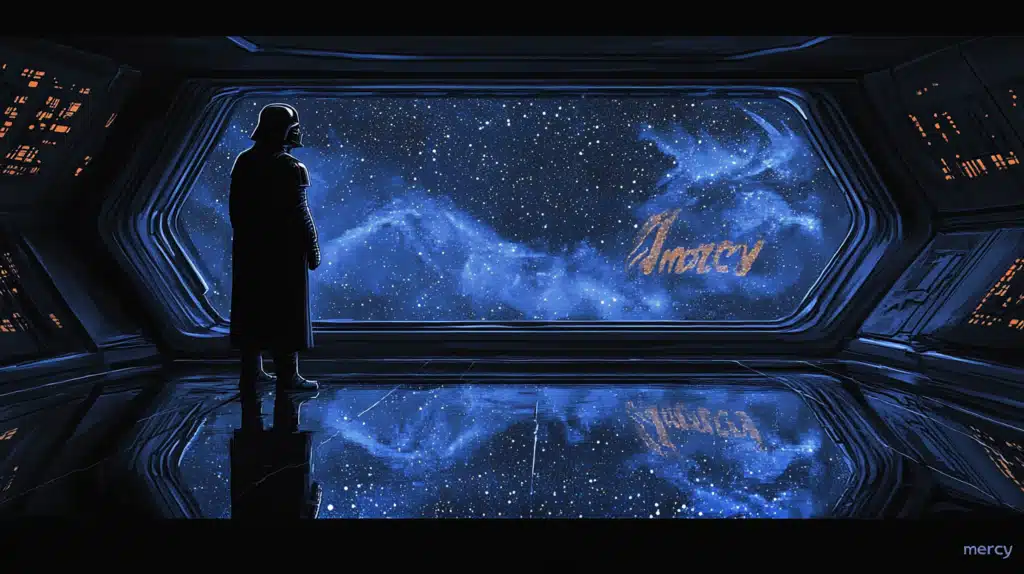
Redemption Isn’t About a Perfect Track Record
In many moral traditions, forgiveness is transactional—do good, earn points, erase bad. But in Islam, it’s more about intention and sincerity than math. True Tawba (repentance) doesn’t mean you’ve never messed up. It means that you’ve stopped running from the truth and turned back toward it—with humility, remorse, and a firm resolve to change.
That’s what makes Vader’s redemption believable in a spiritual sense. He doesn’t beg for forgiveness. He doesn’t give a dramatic monologue. He simply chooses to act selflessly, with no reward in sight. His final act is an expression of both regret and transformation.
He doesn’t return to being Anakin Skywalker by name. He returns to who he was spiritually. And that’s what matters most in the context of repentance.

Sincerity Over Spectacle
Islamic teachings emphasize that God looks at the heart—not the performance. You could give away a planet’s worth of gold, but if it’s done for show, it doesn’t count. On the other hand, a single tear shed in sincere remorse? That could be the beginning of complete spiritual renewal.
“Allah does not look at your appearance or your wealth, but He looks at your hearts and your deeds.”
— (Hadith, Sahih Muslim)
Vader’s face is literally scarred and broken in his final moments. He’s physically ruined, emotionally drained, and spiritually exposed. But in that moment, his heart is finally in the right place. And that’s what counts.
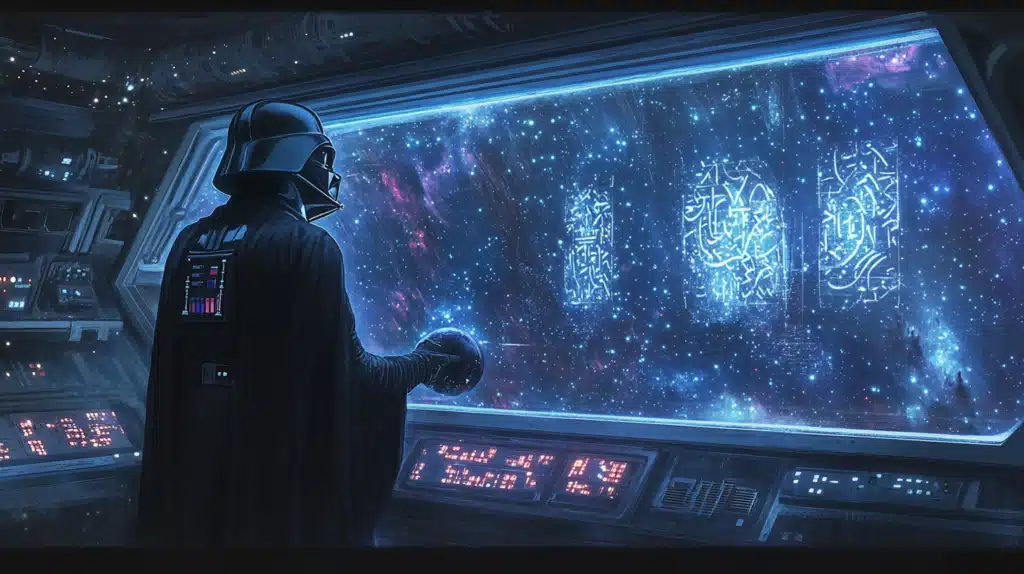
Forgiveness Is Divine—Not Always Human
Now, let’s be clear: forgiveness doesn’t erase consequences. In Islamic theology, God can forgive sins, but that doesn’t mean human justice is sidelined. Vader still dies. He doesn’t get a parade or a second chance to lead. His redemption is personal, not public. It’s between him, the Force, and the son he saved.
This is a powerful reflection of a truth in Islam: Forgiveness is about your relationship with the Divine. You may still face the effects of your actions in this world—but spiritually, you can be cleansed. That’s the balance between mercy and accountability.
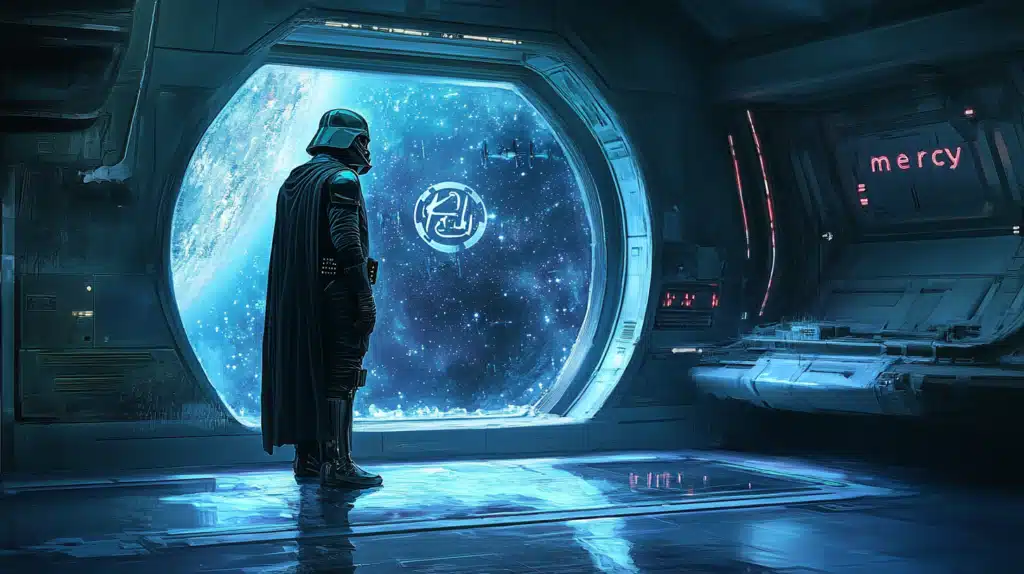
A Redemption Earned, Not Handed Over
So yes, according to Islamic belief, even someone with a past as catastrophic as Darth Vader’s can be forgiven—if the repentance is real. It has to be more than regret. It has to be change.
And in that last moment—when Anakin Skywalker finally reappears, not with words but with action—it’s clear that something deeper than the Force is at work. It’s the universal truth that no one is beyond redemption, as long as they’re willing to turn back and let go of the darkness.
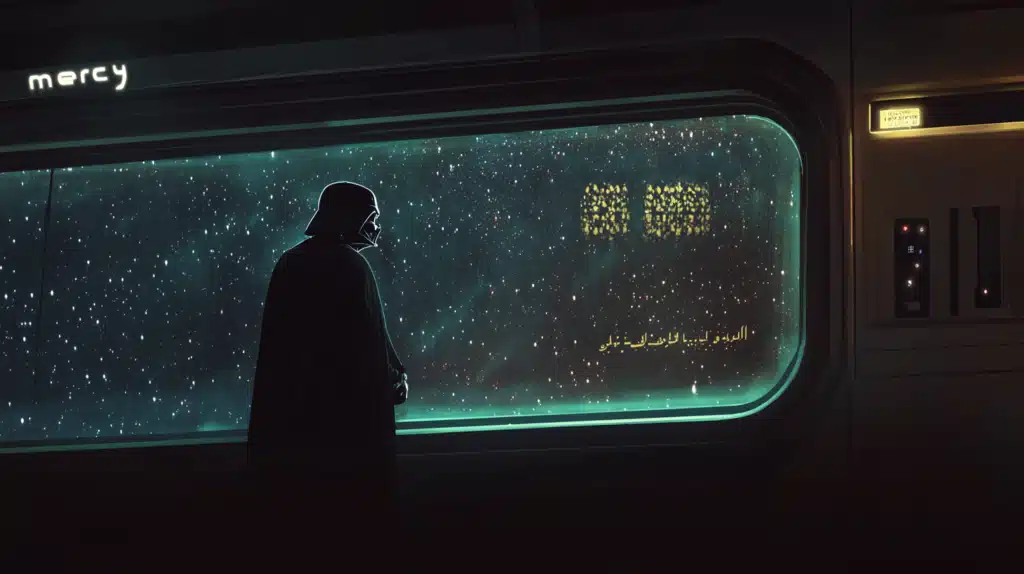
Redemption Requires Sacrifice (And a Little Bit of Smoke Damage)
Let’s be honest—if anyone could’ve coasted through a redemption arc with minimal effort, it would’ve been Darth Vader. He’s got the legacy, the lore, the fanbase. But true redemption in both storytelling and Islamic theology doesn’t work like a loyalty program where you just rack up enough “good guy” points to cancel out the bad.
Redemption requires sacrifice. Real, painful, personal sacrifice.
And in Vader’s case, it costs him everything—his power, his position, his armor, his life.
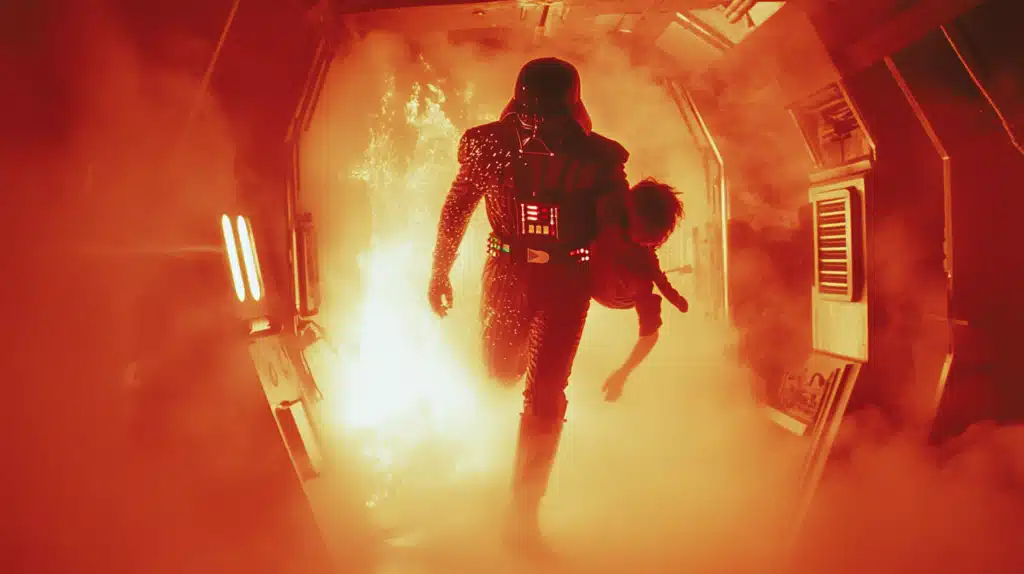
The Cost of Turning Back
In Islam, repentance (Tawba) isn’t meant to be easy or convenient. It’s meaningful precisely because it’s hard. To turn away from a path of destruction and ego and choose humility often means letting go of the very things that once defined you.
Vader didn’t just reject the Emperor in a quiet, off-screen decision. He lifted the most dangerous Sith in the galaxy over his head and hurled him into a reactor shaft. And in doing so, he absorbed a lethal dose of Force lightning and burned out what was left of his life support systems.
That wasn’t just a cool action scene. That was a visual metaphor for spiritual rebirth through sacrifice.
“Indeed, Allah has purchased from the believers their lives and their properties [in exchange] for that they will have Paradise.”
— Surah At-Tawbah (9:111)
Vader gave up everything that made him powerful to reclaim what made him human. That’s not just a redemption arc—it’s a spiritual awakening wrapped in smoke and sparks.
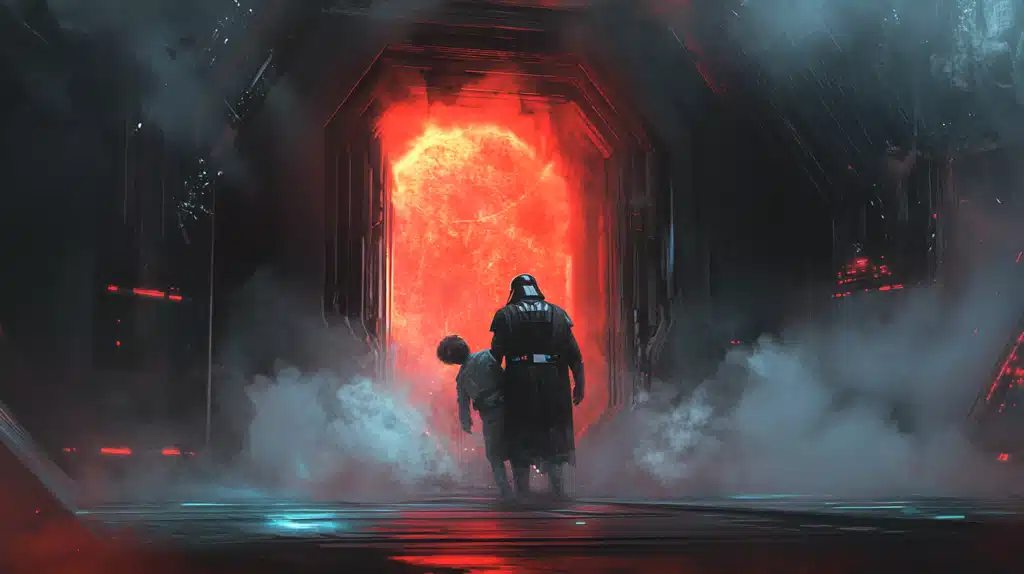
Sincerity Is Proven by Action
In Islamic tradition, one of the signs of sincere repentance is doing good deeds to make up for past wrongs—not to cancel them out, but to demonstrate real change. It’s not about balancing a scale. It’s about transforming the self.
“And establish prayer at the two ends of the day and at the approach of the night. Indeed, good deeds do away with misdeeds. That is a reminder for those who remember.”
— Surah Hud (11:114)
Vader didn’t just say “sorry.” He made a choice that actively undid harm. Saving Luke wasn’t just personal—it was the moment the Sith’s reign began to unravel. His repentance meant something because he acted on it.
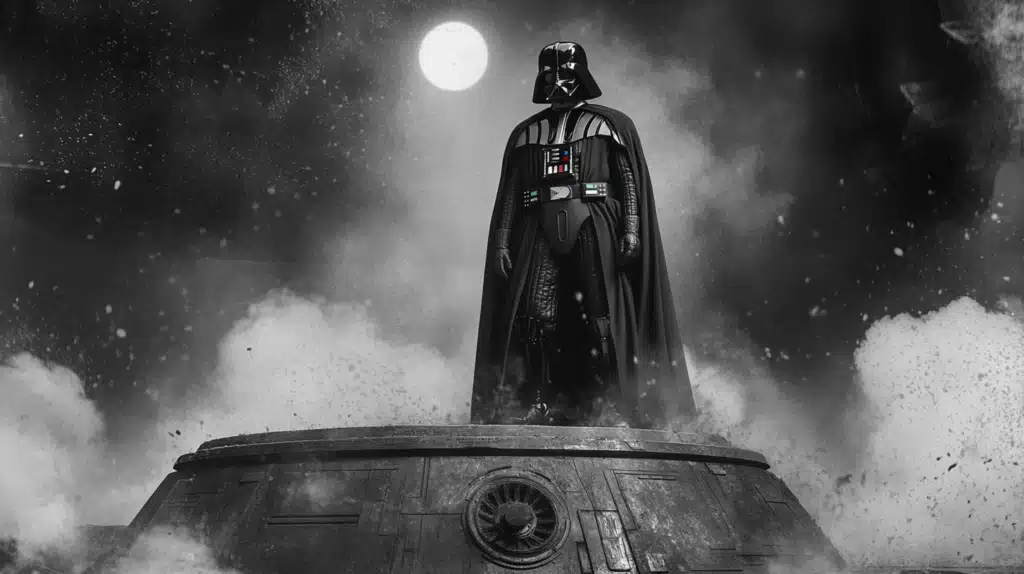
Letting Go of Ego and Identity
Repentance also requires the death of ego. And in Vader’s case, that death was literal and symbolic. When Luke removes his helmet, we finally see the man underneath—the frail, scarred, vulnerable face of someone who has let go of the mask he wore for decades.
He asks to look at his son “with [his] own eyes.” That line hits hard because it marks the moment he reclaims his soul. In Islamic spirituality, returning to God in sincerity often involves stripping away everything false, prideful, or performative.
It’s not about how you appear—it’s about who you really are when the mask comes off.
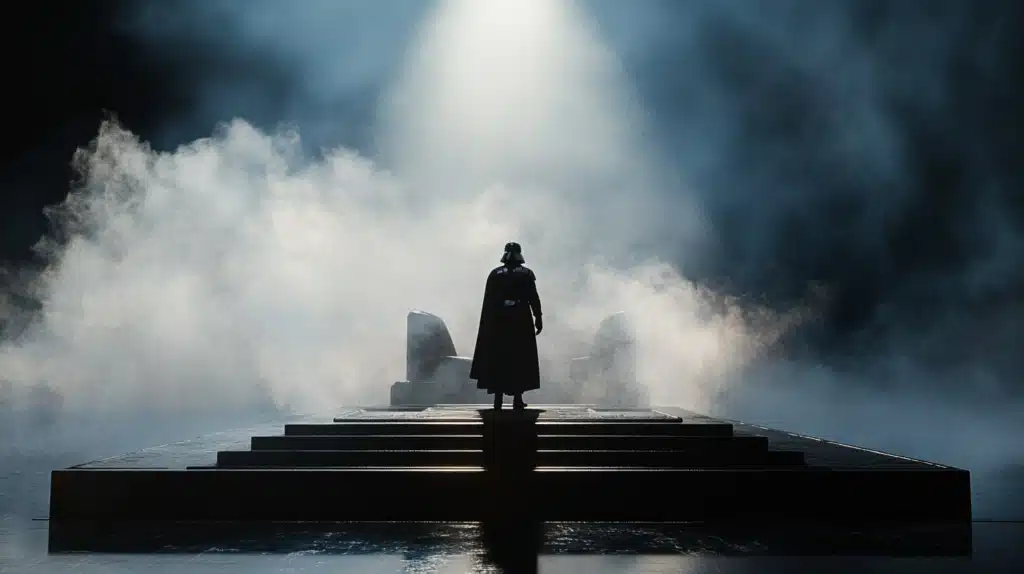
Sacrifice as a Path to Purification
Islam teaches that hardship endured on the path of repentance can purify the soul. And while Vader’s purification involved a bit more lightning than most of us will (hopefully) face, the principle is the same: sincere repentance sometimes hurts—but it heals.
He dies in his son’s arms, not as a Sith, but as a father. Not as a warlord, but as a man. And in doing so, he finds peace.
“Except for those who repent, believe and do righteous work. For them Allah will replace their evil deeds with good.”
— Surah Al-Furqan (25:70)
Vader’s final act doesn’t erase his past, but it transforms his ending. And that transformation is at the heart of both storytelling and theology.n, a surrender, and a return to the Light. That’s not just character development. That’s spiritual growth.
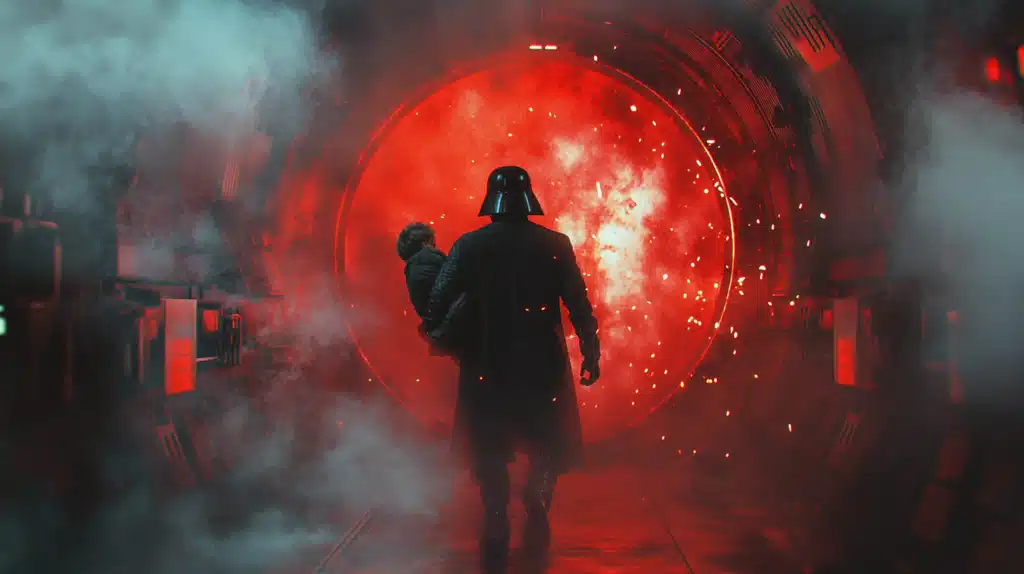
What Star Wars Gets Right About Forgiveness
For all its lightsabers, space dogfights, and dramatic cape flourishes, Star Wars has always been, at its heart, a story about hope, choice, and forgiveness. And when it comes to Darth Vader’s redemption arc, the saga touches on something deeply resonant—especially when viewed through the lens of Islamic teachings: the belief that forgiveness is always possible, but never shallow.
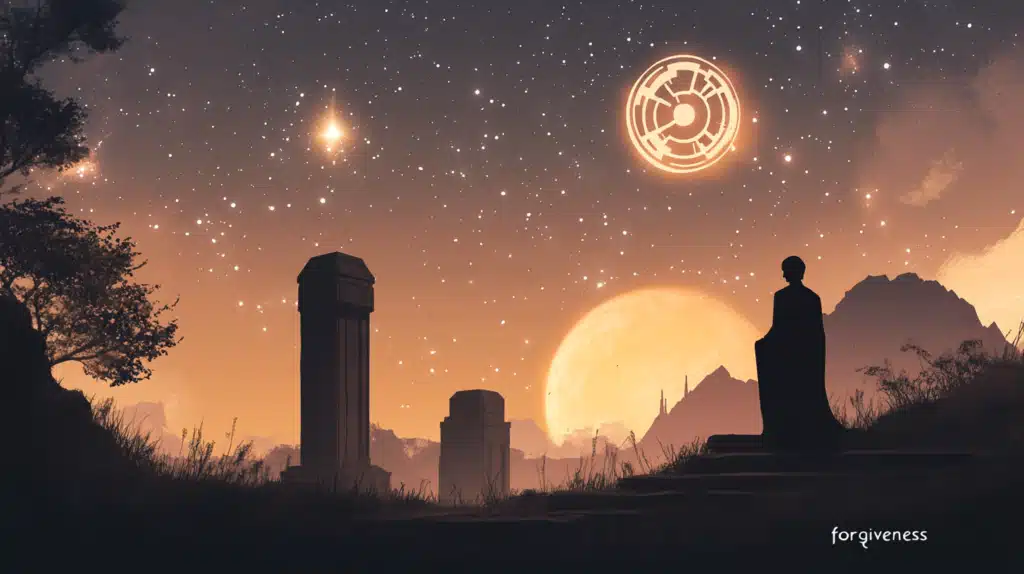
Forgiveness Is Earned Through Change, Not Status
Let’s be real—Darth Vader wasn’t just some guy who made bad decisions on weekends. He was a walking war crime in a cape. So when he turns back to the Light, it’s not about ignoring the past. It’s about recognizing that no one is too far gone to make a different choice.
Islamic teachings echo this clearly: a person’s past does not define their future if they sincerely repent. The story of Adam’s repentance, of Moses accidentally killing a man and later leading a nation, or of countless others in the Quran who fell but rose again—all show that forgiveness isn’t about spiritual elitism. It’s about honest transformation.
“Verily, Allah loves those who turn to Him in repentance and those who purify themselves.”
— Surah Al-Baqarah (2:222)
Vader’s story reminds us that the opportunity for forgiveness isn’t reserved for the morally pristine—it’s open to the deeply flawed, the broken, and even the formerly Sith.
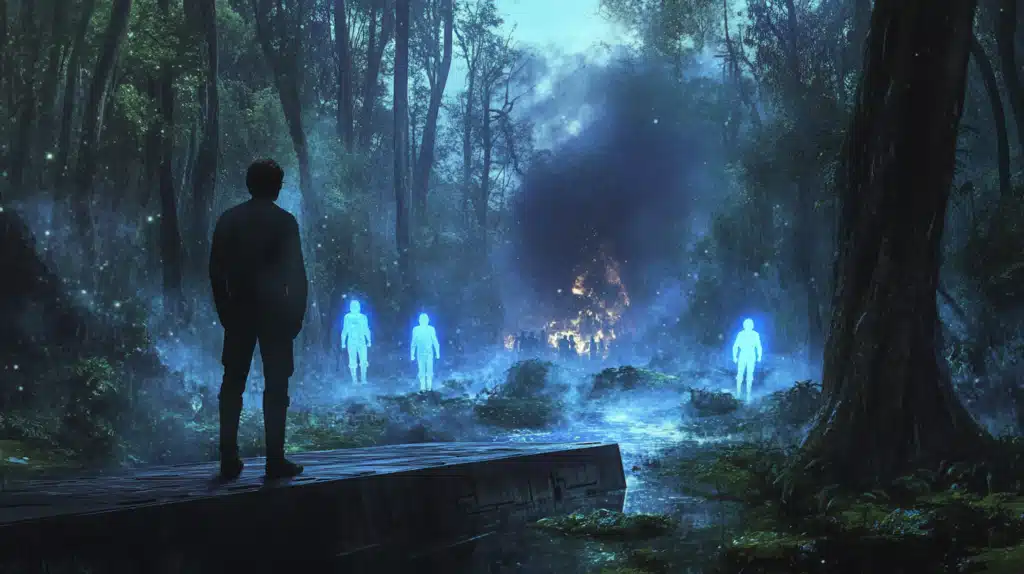
Redemption Doesn’t Erase the Past, But It Changes the Ending
Another thing Star Wars gets right? Redemption doesn’t mean forgetting. The galaxy doesn’t magically reset after Vader’s turn. The damage he caused doesn’t vanish. But his final choice matters because it stops the harm and begins a new legacy.
In Islamic tradition, sincere Tawba doesn’t delete your past like a backspace key. It transforms your spiritual state. Some narrations even say that for the truly repentant, past sins can be converted into good deeds—not because the actions were good, but because the act of returning to God is so powerful.
“Except for those who repent, believe and do righteous deeds—for them Allah will replace their bad deeds with good.”
— Surah Al-Furqan (25:70)
Vader’s redemption doesn’t make him a saint. It makes him someone who, in the end, chose the right thing when it mattered most. And in many ways, that’s even more powerful than perfection.
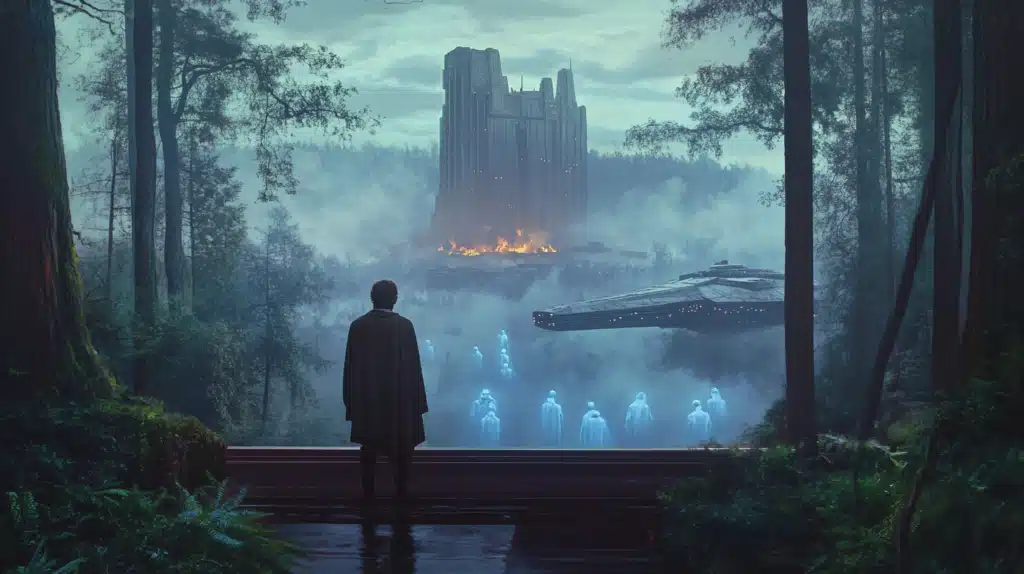
Forgiveness Is Between You and the Divine
Luke forgave his father. That was huge. But even if he hadn’t, Vader’s moment of redemption still stands—because in Islam, true repentance is between the individual and God. No public apology. No ceremonial cleansing. Just sincerity.
“Your Lord has decreed upon Himself mercy…”
— Surah Al-An’am (6:54)
This emphasis on divine mercy mirrors what Star Wars subtly portrays: the Force—like God’s mercy—isn’t something you earn through power. It’s something you align with through intention and truth.
Vader didn’t earn redemption by killing Palpatine. He received it because his act came from a place of truth, selflessness, and spiritual clarity.

Even the Strongest Fall. Even the Fallen Can Rise.
The Jedi were powerful. But they fell. Anakin was powerful. And he fell. The Emperor seemed unstoppable—until he wasn’t. Star Wars shows over and over that strength isn’t measured by control or dominance. It’s measured by the ability to turn away from darkness, even when you’ve lived in it for a long time.
Forgiveness, in both the saga and in Islam, isn’t about perfection. It’s about humility. It’s about recognizing your wrongs, making amends, and doing better.
And that’s a universal message—whether you’re wielding a lightsaber or just trying to make it through life without force-choking your coworkers.
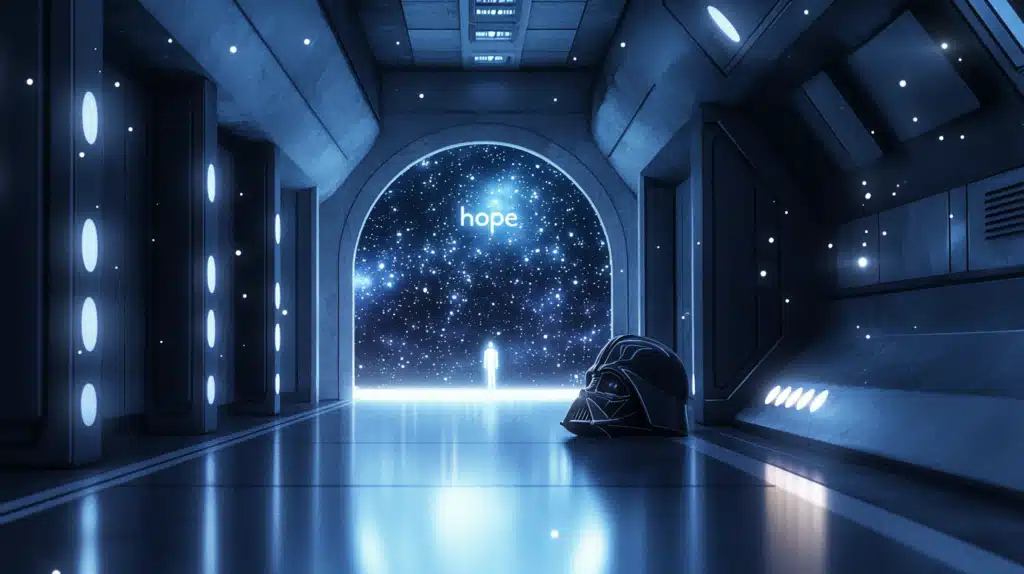
Conclusion: No One Is Beyond Redemption—Not Even Darth Vader
Darth Vader’s redemption arc is one of the most powerful stories in modern pop culture—not because it’s flashy or filled with grand speeches, but because it reflects something ancient, spiritual, and deeply human: the idea that no matter how far someone falls, they can always turn back.
In Islamic teachings, this concept is at the heart of Tawba—sincere repentance. It doesn’t promise an easy path. It doesn’t erase the past. But it offers something far more meaningful: hope.
Hope that change is possible.
Hope that mercy is greater than mistakes.
Hope that even someone who’s worn the mask of a villain can reclaim their soul.
Anakin Skywalker didn’t erase his sins. He acknowledged them. He felt remorse. He turned away from them. And when the moment came, he acted—not for power, but for love, justice, and peace. In doing so, he embodied exactly what the Quran teaches: that the door to forgiveness is never closed, as long as the heart sincerely seeks it.
“And turn to your Lord in repentance and submit to Him before the punishment comes upon you; then you will not be helped.”
— Surah Az-Zumar (39:54)
The story of Darth Vader isn’t just a science-fiction narrative—it’s a moral parable wrapped in space opera aesthetics. It reminds us that redemption doesn’t require perfection. It requires truth. It requires sacrifice. And most importantly, it requires the willingness to change.
So whether you’re a Jedi, a rebel, a stormtrooper, or just someone who’s made more than a few mistakes—remember this: you’re not defined by your worst moment. You’re defined by your next decision.
And in both Star Wars and Islam, the light is always there—you just have to choose it.


